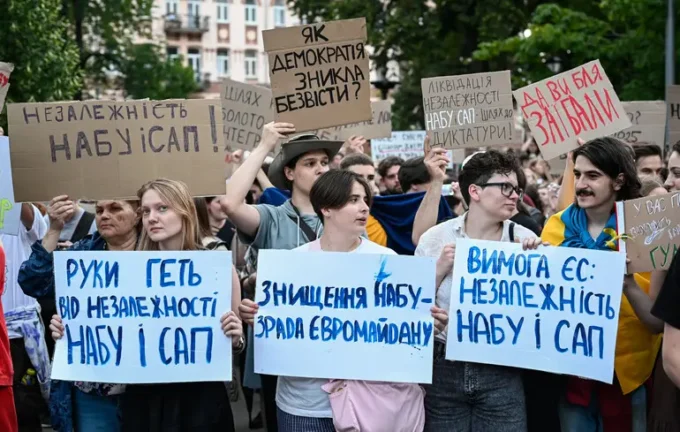Mass protests in Kyiv against attempts to dismantle the independence of NABU and SAP: what lies behind the demonstrations?

During the first two days of protests in Kyiv against threats to the independence of the National Anti-Corruption Bureau (NABU) and the Specialized Anti-Corruption Prosecutor’s Office (SAP), over 15,000 citizens gathered on the streets.
According to the monitoring group «OZON», which collaborates with the Center for Civil Liberties, these large crowds are not accidental—they reflect deep dissatisfaction and concern regarding recent actions by the parliament and the president in the fight against corruption.
Coordinator Ivanna Malchevska emphasized that the number of participants at the initial rallies and police presence reveal a significant imbalance.
On the first day, more than 5,800 people participated, while only 11 police officers were present, 7 of whom were dialogue police.
This suggests that law enforcement is pursuing a de-escalation approach, aiming to avoid provoking protesters and engaging in communication rather than confrontation.
The next day, July 23, following the adoption of Law No.
12414 by the Verkhovna Rada, the number of protesters increased to nearly 9,600 with only 17 police officers patrolling, 10 of whom were dialogue police.
This striking discrepancy indicates the government’s cautious strategy to prevent conflict and give the public a sense of openness.
However, the actions around Law No.
12414 sparked wide political debate.
President Zelensky signed the legislation despite objections from NABU and SAP leaders, who tried to convince him not to do so.
This decision triggered a deep political crisis, accompanied by protests and disapproval from Western partners.
Only after prolonged negotiations and public pressure was Law No.
13533 adopted, restoring the independence of NABU and SAP.
This turnaround was possible thanks to active civil engagement and international support, which threatened Ukraine with aid cuts if efforts to undermine anti-corruption institutions continued.
Will lawmakers recognize the importance of maintaining anti-corruption efforts and support the new legislation? And what does this mean for Ukraine’s future — insights provided by Inna Vedernikova in her analytical article «The Thin Ice of Ukrainian Statehood.
What Will Happen Tomorrow?»

